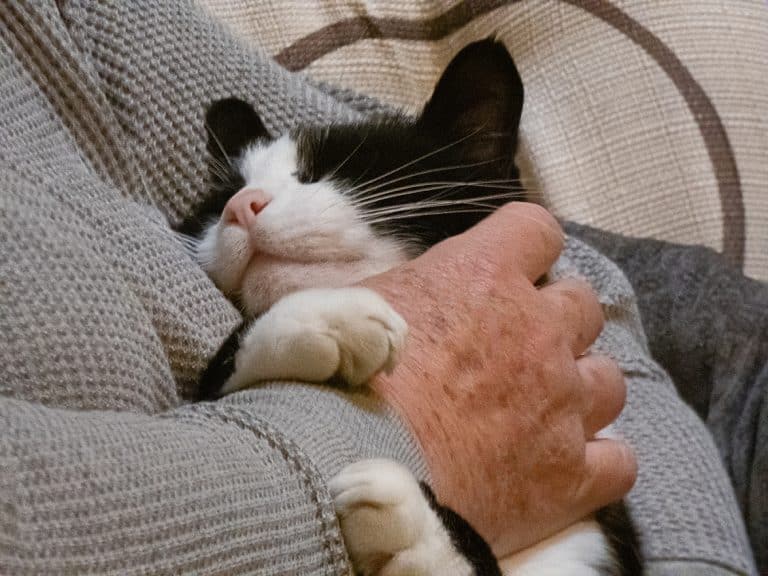A care home manager’s guide to pet therapy
- Categories: Care Activities
Joe Webber
Share this article
Why might you use pet therapy?
With growing awareness on mental health and wellbeing across the nation, care homes are increasingly on the lookout for a variety of engaging and social therapies to benefit their ageing client-base.
While care homes should provide a warm and safe environment for people who require care, that adjustment from independent living to life in a care home can be difficult. This is especially true in the initial stages as residents adapt to their new environment and establish new friendships and relationships.
For some, this shift can be a confusing, distressing and lonely time with negative implications on personal wellbeing. To help improve resident integration, care homes are seeking methods proven to lift low mood, provide a different focus to the day and stimulate alternative conversations. When done successfully, this can help new residents settle in smoothly and live fulfilled and happy lives in their care setting.
The UK is known for its love of animals, so it’s no wonder that one of the most popular activities to support the integration and care process is pet therapy (or animal therapy).

What is pet therapy?
Pet assisted therapy in care home settings comes in a variety of forms. It’s essentially providing treatment for mental or physical conditions through interaction between residents and animals. This may include simply having a dog or cat on-site for everyone to share. For residents who have been used to regular contact with animals, having a pet companion from the very outset of their arrival can be particularly reassuring and can ease the settling in period.
For more specialist therapy, certain breeds of dog have been trained to support those with vision or hearing loss, and recently, dogs are being trained to assist with other, extensive health problems. For example, some dogs can sense the rise and fall in a diabetic’s blood sugar levels or the onset of a panic attack.
Whilst dogs can be intelligent creatures, first and foremost with the right training and care, they make excellent companions that give unconditional affection. Far more independent by nature and less physically demanding, cats too can be equally sociable and friendly. A kitten acquired soon after weaning can learn to interact comfortably with people.
But resident pets can extend beyond at dogs and cats. Different animals may even unlock memories and anecdotes about past pets prompting animated exchanges and laughter. Rabbits are another popular care home addition and are far easier to look after. Introducing a budgie to a social area can provide a different focus for residents as they listen to its chirruping.
Chickens and ducks are also proving to be a well-received by care homes. You may like to consider hatching eggs in an incubator on-site: a guaranteed way to gain the interest of your residents. Having chickens provide fresh eggs each day is another talking point not just with residents but also with visiting families and friends. Not only that, collecting eggs can be a way to get some fresh air and exercise, adding a sense of purpose to the day.
Getting started with pet therapy
If having a resident pet is not feasible in your care setting, several charities offer animal therapy. Visiting donkeys, alpacas or kid goats can have hugely beneficial effects, brightening your residents’ day with their unique characteristics. Pets as Therapy, operating nationwide, and TheraPaws, operating across London and surrounding area, are two well established charities with a team of volunteers who are happy to bring their friendly, temperament-tested and vaccinated pets into care home settings to be enjoyed, patted and stroked by residents.
You could also consider running animal workshops for residents where they are offered the opportunity to encounter different animals and hold and stroke different textures from cute and fluffy rabbits, guinea pigs and hamsters to silky smooth or scaly reptiles and snakes. Whatever version you opt for, such a visit will afford an experience and a memory to remain with your residents long after the event and will assuredly enhance verbal communication with others, self-esteem, motor skills and social engagement.

Benefits & risks of pet therapy
If in any doubt about the beneficial effects of pet therapy in care homes, have a look at what the Alzheimer’s Society has to say about its impact on dementia sufferers. As with other research studies, the Alzheimer’s Society determined that anxiety, depression, social interaction, sleeping patterns, irritability, agitation and loneliness are all improved through the affection and playfulness of pets.
Whatever benefits animals in care homes may bring, preparation is vital. Pets are not for everyone. Some residents will have serious allergies to pet hair, others may have had a past traumatic experience with an animal or may simply not like them. Remember, as with anything new you are introducing to your setting, you will need to have policies and procedures in place to cover all eventualities including who cleans up any accidents.
Learn more about CareDocs
We hope the above has given you some insight into the benefits of introducing pet therapy to your care home. Here at CareDocs we pride ourselves on understanding every aspect of having the right care in place for each and every one of your residents. Did you know you can record activities and emotions against a resident to keep track of their likes and dislikes? You can also create and store your policies and procedures.
For an informal discussion on how we can help you monitor and manage the social, emotional and mental health and wellbeing of your residents, please contact us today to learn more about our software and solutions by phoning 0330 056 3333 or via email at support@caredocs.co.uk.
Looking for more info about alternative therapies? Here’s an ebook you might find useful:
A care home manager’s guide to music therapy
Share this article
Author
Joe Webber
Search
Recent articles
- CareDocs Partners with the Professional Record Standards Body (PRSB) to Support Care Standards Fit for the Future of Digital Care January 30, 2024
- CareDocs Joins the Care Software Providers Association (CASPA), an Independent, Not for Profit Association, Representing Software in the Care Industry January 19, 2024
- CareDocs partners with Bristol Waste to tackle digital poverty January 10, 2024
Recent comments
- 1.2. Assess use of care plans in applying person-centered values - CIPD Writers on What is person centred care planning and why is it important?
- Call tracking tips for care home marketers - Chester Times on The importance of effective communication in care
- Why is effective communication important for positive relationships with individuals in care? - Building-Craft on The importance of effective communication in care











